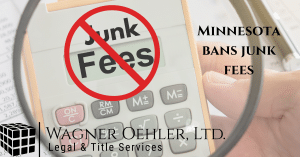Menu


 Minnesota Bans Junk Fees
Minnesota Bans Junk FeesMinnesota has recently taken a significant step towards consumer protection with the passage of a new "junk fee ban" law, aimed at ensuring pricing transparency across various industries. Signed into law by Governor Tim Walz in May 2024, the legislation will take effect on January 1, 2025, and targets the often frustrating and misleading practice of adding hidden or unexpected fees to the cost of goods and services.
"Junk fees" refer to additional charges that are often tacked on to the advertised price of a product or service. These fees can include anything from service charges at a restaurant to hidden costs in concert tickets, hotel stays, or online orders. Often, these fees are only revealed at the final stages of a purchase, catching consumers off-guard and inflating the final price significantly beyond the initial, advertised cost.
Under this new law, businesses operating in Minnesota will be required to include all mandatory fees in the upfront price they advertise. This means that consumers will know the true cost of what they are purchasing right from the start, with no surprise charges appearing later in the transaction. The legislation applies broadly across various sectors, including but not limited to:
The law is expected to benefit consumers by providing clearer, more honest pricing. By eliminating surprise fees, Minnesota is aiming to foster a marketplace where competition is based on transparent pricing, which could ultimately drive down costs as businesses strive to appear more competitive.
However, the law will require significant adjustments for businesses, particularly those that have relied on these hidden fees as a revenue stream. Companies will need to reassess their pricing strategies and ensure compliance by the start of 2025.
Minnesota’s new "junk fee ban" law marks a decisive move towards consumer rights, ensuring that prices are straightforward and transparent. As businesses adapt to this new regulation, consumers can look forward to a purchasing experience with fewer unwelcome surprises and more clarity on costs. This law sets a precedent that could inspire similar actions in other states, further shifting the tide towards greater transparency in the marketplace.
Keep an eye on our Events page, located at: https://www.wagnerlegalmn.com/events/ for free upcoming seminars about business owner updates.
If you’d like to meet with an attorney to explore ways to ensure compliance with business owner laws, contact us to get started.
Want to stay informed? Subscribe to our quarterly newsletter for updates.
© 2026 Wagner Oehler, Ltd
Legal Disclaimer | Privacy Policy
Law Firm Website Design by The Modern Firm